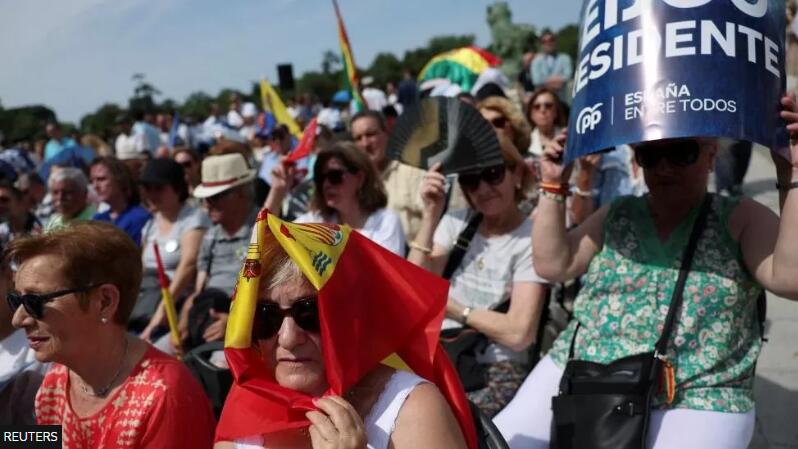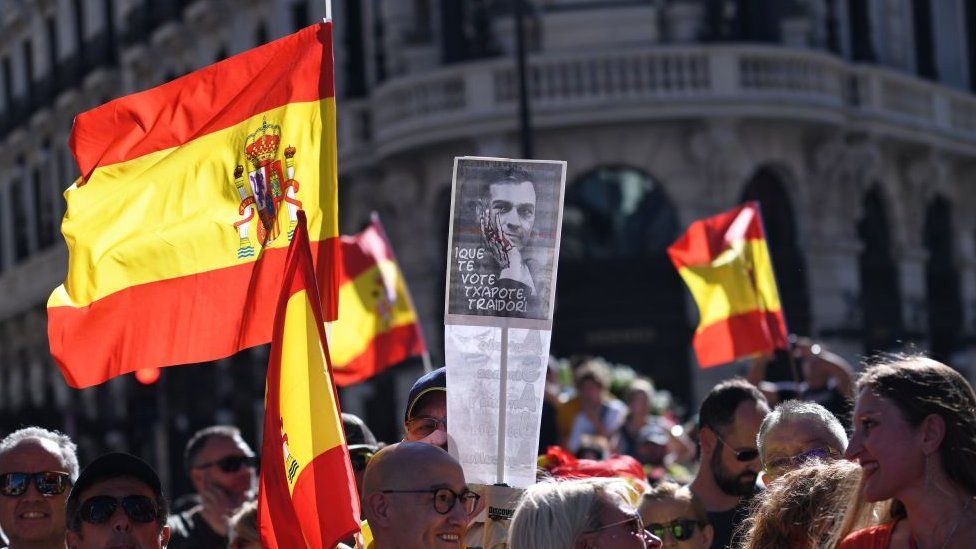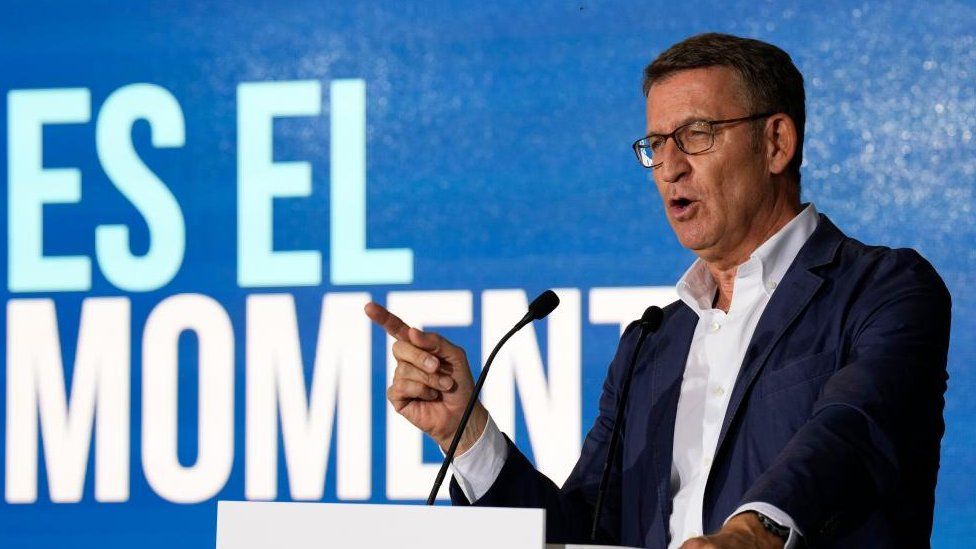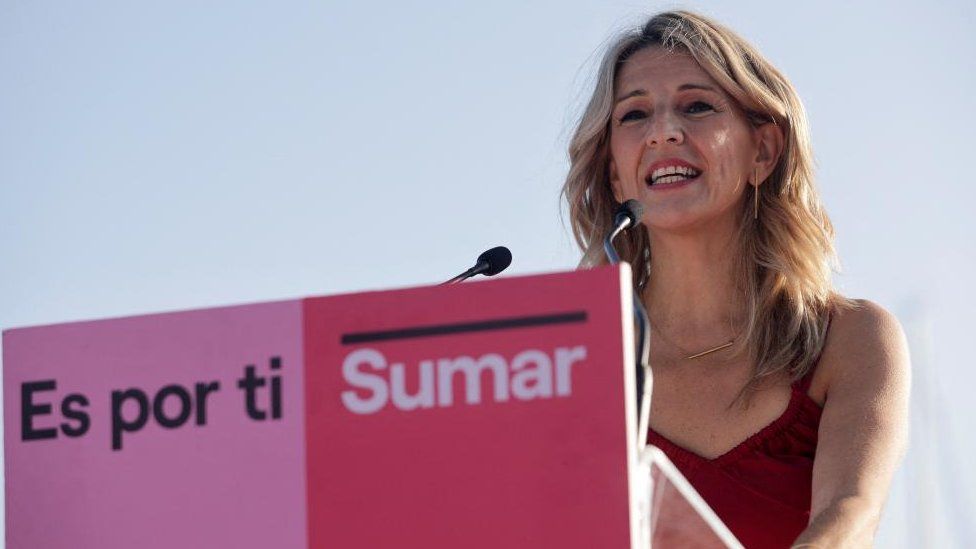
Spain’s hot summer election: A simple guide
Spain is holding a highly unusual election next Sunday at the height of a scorching summer, after four years of left-wing rule.
Current Prime Minister Pedro Sánchez called the vote in response to a dismal performance at the May local elections in which his Socialist party came second to main rival, the conservative Popular Party.
No general election in Spanish history has ever been held so late into the summer, in this country of 48 million people. The timing of the 23 July vote has been widely criticised when temperatures in many parts of Spain have reached 40C and up to 10 million Spaniards are on holiday.
The Popular Party (PP) under Alberto Núñez Feijóo have their eye on victory but their lead has narrowed in the polls. To win a majority, they need to secure more than half the 350 seats in the lower house of parliament. Spaniards will also vote for their upper house.
Neither the PP nor the Socialists are projected to win enough votes to govern on their own. The conservatives would likely need the support of far-right party Vox, while Mr Sánchez would look to left-wing grouping Sumar.
Sexual consent, nationalism and the economy
LGBT and gender issues have become prominent campaign issues in the run-up to this election. Opposition parties PP and Vox have staunchly criticised the left-wing government’s new laws on transgender rights – including making it easier for people to change their legal gender – and abortion.
They have also attacked Spain’s controversial “Only Yes Means Yes” law on sexual consent. It was passed only last August but created a loophole that cut jail time for over 1,000 convicted rapists – and Mr Sánchez ended up having to apologise and push through changes.
The very existence of gender violence has been questioned by some Vox party officials, causing tensions with their potential conservative partners.
Nationalism has been a hot issue too. The PP and Vox have labelled Mr Sánchez a “traitor” for pardoning jailed pro-independence leaders and downgrading the crime of secession.
One highly effective right-wing tactic has involved targeting the prime minister with a slogan for relying on separatists to pass key reforms.
He has been denounced for his pact with Basque separatist party Bildu, led by Arnaldo Otegi, who was jailed for crimes by the Eta militant group.

The slogan Que te vote Txapote, meaning “Let Txapote vote for you”, refers to another Eta militant who carried out a number of deadly terror attacks.
As Spain experiences worsening droughts and heatwaves, most parties have measures to fight climate change. Only Vox’s electoral programme fails to mention the issue entirely.
The biggest issue for most voters is the economy, even if much of the campaign has focused on other issues. Spain is enjoying a period of growth and inflation slowed to below 2% in June, one of the lowest levels in Europe.
But dismal jobless figures are one of the opposition’s most frequent lines of attack against the current government. In May, Spain had the highest unemployment rate (12.7%) of all EU countries.
Who to watch
Pedro Sánchez

He became the first politician in Spain to snatch power from a sitting prime minister through a no-confidence motion in 2018. Then he narrowly won a confidence vote in January 2020 to form Spain’s first coalition government since democracy was restored in the late 1970s.
Pedro Sánchez, 51, is seen as a passionately pro-European integrationist and speaks English fluently; he has lectured in economics in Spain and had a spell working for the UN high representative in Bosnia-Herzegovina.
His brand of governing has been labelled Sanchismo, and his opponents have styled the election as a choice between Sanchismo or Spain, suggesting he is a threat to the country, its traditions and values.
He has spearheaded a law to bring dignity to victims of dictator Gen Francisco Franco, backed a rule giving workers the right to menstrual leave and laws expanding abortion rights.
But this snap election could be a gamble too far, as his party trails his conservative rivals. He has accused the PP of seeking to put Spain in a “sinister time machine” with the support of far-right Vox and take the country back to “who knows where”.
Alberto Núñez Feijóo

The Popular Party leader has knowingly cultivated a low-key image, saying recently that “what for some may be boring, I think for the majority of citizens are qualities that a prime minister should have”.
But he was seen to have won the only head-to-head TV election debate, telling Mr Sánchez he had no right to give lectures on governing pacts as he relied on separatists.
A former civil servant born in Galicia in Spain’s north-west, he has led the conservatives since 2022.
He has gained a reputation as a safe pair of hands, serving as president of the former national health service and of the postal service.
Santiago Abascal

He has led the far-right Vox party he helped found in 2014, and he is known for his controversial declarations. He has said he does not believe in climate change and he has criticised the “totalitarian law of gender ideology”, which he claims criminalises men.
Last month, he used the riots in France to call for tougher immigration policies. “Europe is threatened by mobs of anti-Europeans… who are unwilling to adapt to our way of life and our laws,” he said. “Europe cannot continue to accept immigrants from Muslim countries.”
Vox has already reached coalition deals with the conservatives in dozens of cities and three autonomous regions – Extremadura in the west, Valencia in the east and Castille and León, north of Madrid. In the Balearic Islands, Vox have reached a pact with the PP but have no positions in government.
Now Mr Abascal is looking for a share of national power too.
He has cultivated strong ties with other European far-right and nationalist groups, from Hungary’s ruling Fidesz and France’s National Rally to the Brothers of Italy party of Italian Prime Minister Giorgia Meloni.
Ms Meloni has given Vox’s election campaign her backing, recording a video to reaffirm the parties’ “great friendship”.
Yolanda Díaz

If Vox are the potential kingmaker for Alberto Núñez Feijóo, then for the Socialists it would be Yolanda Díaz’s Sumar (Unite) alliance of 15 left-wing groups.
A former Communist, she has been Spain’s second deputy prime minister as well as labour minister and she is keen to be Spain’s first female leader too: “because women’s time has come, and women want to be the ones who make history”.
Sumar have made a big pitch for the youth vote, pledging €20,000 (£17,139) of funding to help 18-23 year-olds to kick-start their lives.
Ms Díaz is a popular politician who has helped increase the Spanish minimum wage to €1,259 and scrapped unpopular labour laws.
Who’s favourite?
While opinion polls have narrowed, the conservatives and Mr Feijóo are favourites to win. But they may need to form a coalition with Vox to form a majority and avoid repeat elections.
Latest polls put the PP on 32-34% of the vote and the Socialists on 28-29%. Vox are on 13-14%, slightly ahead of Sumar with 12-13%.
To win an absolute majority a party needs 176 seats, so no party would win outright with these results.
PP and Vox: An uneasy partnership
Although Vox has made great strides in securing power-sharing deals with the conservatives in three of Spain’s autonomous regions, and lesser deals in Murcia and the Balearic Islands, Mr Feijóo is less than enthusiastic at the prospect of governing with the far right.
The PP leader has seemed rattled by his rival’s accusations of a “shameful” pact with Vox.
In their TV debate Mr Feijóo said Vox’s Mr Abascal would not be a member of a prospective PP government “if I don’t need the votes”. He even offered the Socialists’ Mr Sánchez a pact for the losing party to support the winner so that neither would need to rely on either the hard right or left.
But Vox could be the only option. Last month Maria Guardiola, the PP president of the western Extremadura region, said she would never govern with a party that “dehumanises immigrants” and that “rubbishes” LGBT rights.
She later changed her mind and welcomed Vox into her government, stating that “my word is not as important as the future of Extremadura”.
As well as taking a hard line on gay marriage, adoption by gay couples, abortion, euthanasia and transgender rights, another big issue that has driven support for Vox is its unequivocal stance on opposing Catalan nationalism.
It has also taken a dim view over the status of Gibraltar, a British overseas territory at the southern end of the Iberian peninsula.
Last year Vox objected to reports of talks between the UK and Spain by warning that “any agreement that does not go through the recognition of the Spanish sovereignty of Gibraltar is an act of treason against Spain”.
Comments (0)